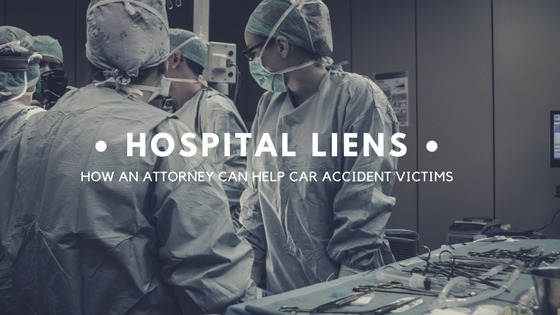Many people who are victims of car accidents can be awarded a significant personal injury settlement. What most individuals who receive these settlements don’t realize is that hospitals and medical care providers can assert a claim against the settlement. Any person or organization who paid for an injured person’s medical bills can also attempt to recover their costs using this legal method. This is known as placing a lien on the settlement amount.
Lien
This is a demand for payment that can be placed on an accident victim’s personal injury case. It is possible for health insurance as well as health providers to place a lien on a settlement in an effort to recover money for medical services provided. It is a process referred to as subrogation. This is when hospitals and others try and legally obtain payment from a settlement awarded to an accident victim.
Hospital Lien Statutes
Texas Property Code, Chapter 55 covers the procedure a hospital or medical care provider must follow to place a lien on an accident victim’s settlement. This lien must be filed in the county where the hospital or medical provider is located. It must also be done 180 days after the accident victim is able to leave the hospital. The documents associated with the lien are legally required have the accident victim’s name and address correct as well as the dates for the services they provided. Should a hospital or medical provider not comply with Chapter 55 of the Texas property code, the lien is not enforceable.
Perfecting A Lien
This is required by law for a hospital or medical provider in Texas to give an accident victim notice about the lien they are placing on a settlement. This notice must meet designated specifications and must be done within a certain period of time.
Payment
It is important for an accident victim to see if any part of their medical bill has been paid and what is the balance. A hospital or medical provider is required to tell if an insurer paid and if the payment was accepted as partial or full payment. They must also show the specific amounts an accident victim was charged or if the amounts were adjusted for some reason.
Bill Balancing
This happens when a hospital or medical service provider charges an accident victim the difference between the charged rate, and what the accident victim’s insurance company paid at a contract rate. This may be prohibited in certain situations especially when a hospital or medical service provider takes payments from Medicare or some type of state Medicaid program.
Reduction of Medical Bills
In certain situations, medical bills may not be part of a settlement offer. Attorneys often argue these bills should not be part of any lien claim against an accident victim’s settlement. This often involves bills for treatments unrelated to a victim’s accident. In some cases, the limits of an insurance policy will be an issue. An attorney will argue that not all the medical damages due their client have been recovered and more.
Suspend Settlement Check
Hospital liens could hold up an accident victim receiving their settlement check. It could happen because a third party involved in the situation wants their payment and is responsible for the liens on the settlement. It is common for the settlement check to not be released until a written confirmation has been received that the hospital and medical service provider liens have been settled. An attorney will know how to make certain an accident victim’s hospital liens are settled and the termination of the case is not affected by it.
A hospital or medical service provider lien will often happen because an accident victim received emergency medical care after their accident. An accident victim may not have health insurance or their coverage may only pay a portion of the bill and more. This is a situation where an attorney will know how to protect an accident victim’s rights and their settlement.
Call Us Today
Call our law offices today at any of our convenient locations and get a free consultation.
You can also contact us online by using our quick contact form.











